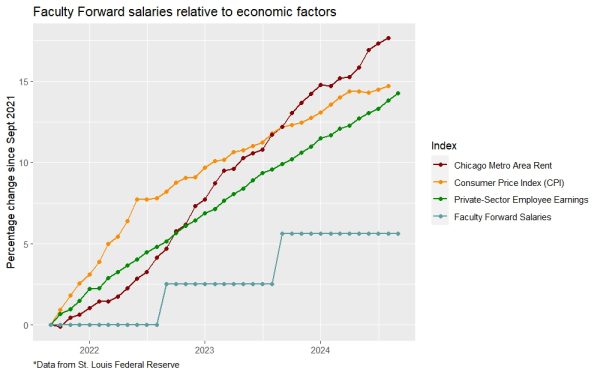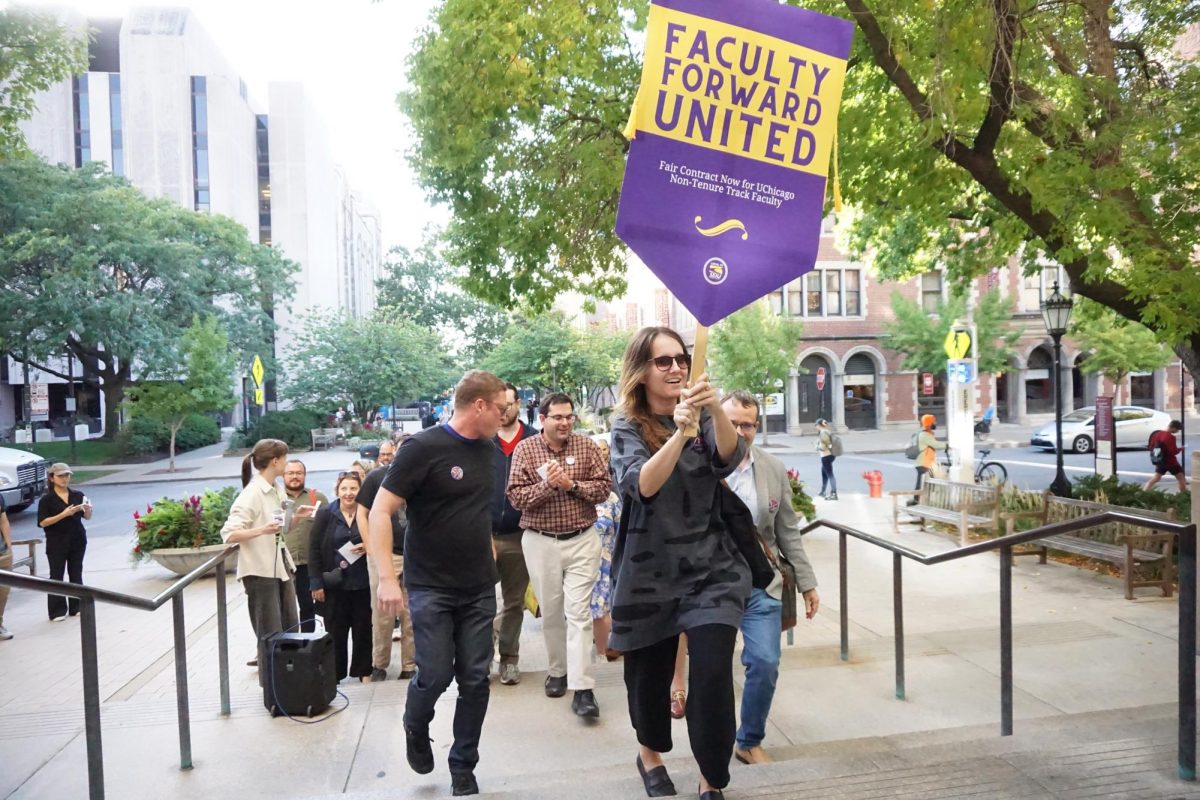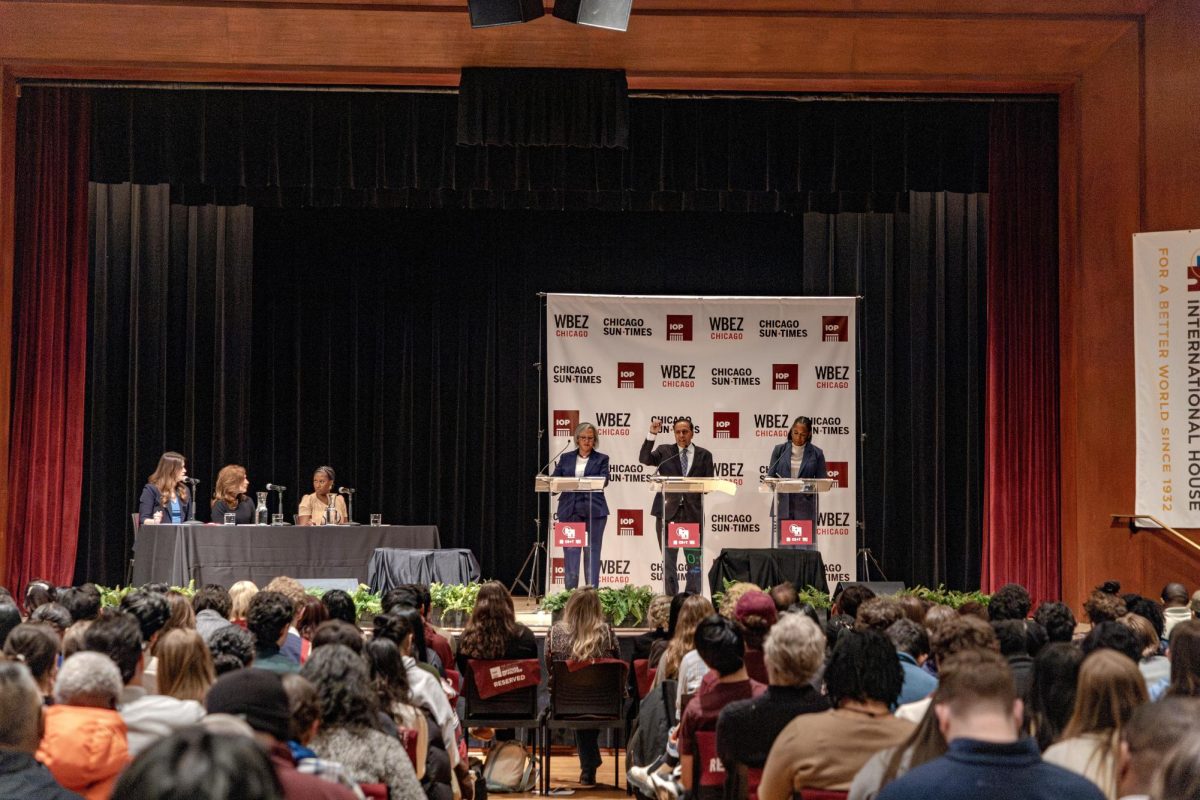On October 3, about thirty members of Faculty Forward, the union representing non-tenure track faculty at the University of Chicago, gathered near the entrance of Levi Hall at 4 p.m. and delivered a petition to University administrators. The petition, addressed to University President Paul Alivisatos and signed by 415 union members—more than 80 percent of Faculty Forward—calls for competitive salaries, benefits comparable to other Top 20 schools, and fairer contract terms.
Union leaders cited frustration with the progress of ongoing contract negotiations as the motivation for the demonstration. A representative of Alivisatos accepted the petition on behalf of the administration.
Faculty Forward was formed in 2015 when non-tenure track faculty at the University voted to unionize and affiliate with the Service Employees International Union (SEIU) Local 73. The union represents more than 500 members, including writing specialists and teaching fellows, who teach roughly 60 percent of all undergraduate classes, according to Faculty Forward data. Since its establishment, the union has successfully brokered two collective bargaining agreements and is currently negotiating its third contract, a process that began in March 2024.
According to Tristan Schweiger, Faculty Forward secretary and assistant professor in the Masters of Arts Program in the Humanities, the union made “a good deal of progress” on non-economic concerns during negotiations over the spring and summer. “We have a much stronger academic freedom and faculty speech article now than we had in the past, and we also have much better language on non-discrimination and anti-harassment, particularly some provisions for dealing with online harassment, which has been a concern for our members,” Schweiger said.
Schweiger noted that the union is close to achieving their goals on immigration and visa sponsorships. The H-1B visa is now the default status of instructional professors and professors who practice the arts. The visa options still remain ambiguous for other types of lecturers, such as Teaching Fellows.
Despite progress in these areas, Schweiger explains that Faculty Forward remains “frustrated” with discussions around faculty compensation, which is central to this round of negotiations. The union argues that salaries have not kept up with inflation, resulting in a 10 percent erosion in faculty purchasing power since the last contract was signed in 2019 (see figure one).

Publicly available data compiled by Faculty Forward shows that UChicago pay for non-tenure track faculty is 18 percent lower than its Ivy Plus university peers.
According to Faculty Forward Co-Chair Jason Grunebaum, the administration responded to the union’s demands by proposing a five-year contract—an increase from the previous three years—with annual wage increases between two to three percent. Faculty Forward’s bargaining committee rejected this offer, explaining that it “essentially just [doubles] down on pay cuts” and adds “an additional two years in the future that we will not get a chance for renegotiation” when considering inflation and increases in living costs.
These difficulties in the bargaining process resulted in the circulation of the petition. “We feel like we need to submit a petition to show the University that we really are willing to fight for a fair contract,” said Agnes Malinowska, a member of the Faculty Forward Bargaining Committee.
During the rally, several members of Faculty Forward delivered speeches in support of the petition’s demands. Grunebaum criticized “UChicago’s narrative of austerity” and questioned how the University has chosen to allocate its financial resources, pointing out that the top 30 executives at the University make more money than the entire 550–person bargaining unit.
Charlie Cunningham, an instructional professor in the mathematics department, built upon this argument: “They say they don’t have any money to pay us. They say it’s a budget shortfall… But our ask, our most ridiculous, generous ask, will cost them at most $11 million… They just don’t want to spend it on undergrads and quality teaching for undergraduates.”
The rally also focused on the status of teaching fellows and writing specialists, whom Faculty Forward identifies as its most precarious groups.
Writing specialists were only recently awarded access to the union’s benefits in May 2023. Sarah Osment, who has been employed as a Writing Specialist for four years, expressed her concerns on the absence of recognition she and her peers receive.
“The University seems committed to segregating writing instructors from other faculty on campus and even other members of Faculty Forward,” Osment said.
Ella Wilhelm, a Teaching Fellow who received her PhD in Germanic Studies in 2023, felt she was misled by the benefits of the position. She explained that her take-home pay was less than the $45,000 compensation offered to graduate students, who have yet to receive their degree.
In a statement to the Maroon, the University said it was “negotiating in good faith” with the union.
“We are grateful for the contributions of the approximately 500 instructional professors and other instructors represented by the union and look forward to working constructively on a contract renewal that will benefit employees and serve students,” the statement added. “We are hopeful for a mutually agreeable resolution to the negotiations.”















